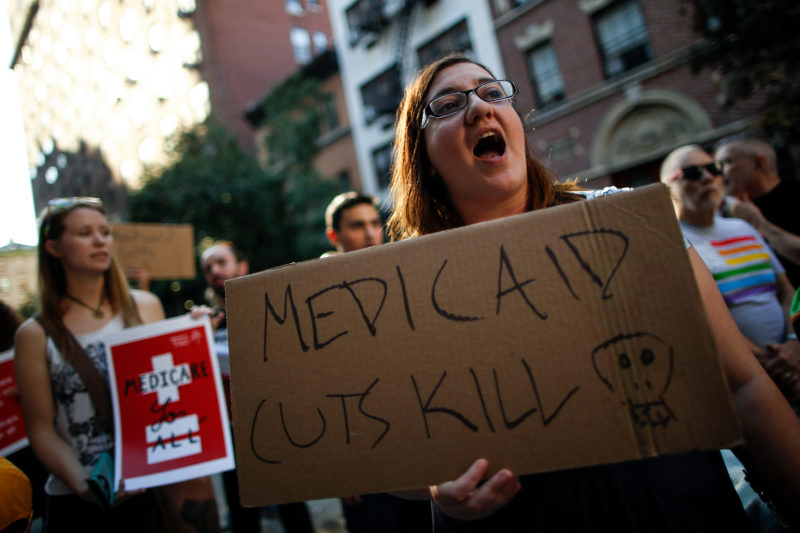The Results on Medicaid Expansion Are in, and They Couldn’t Be Worse for GOP Lawmakers
After Tuesday's midterms, GOP legislators might be the only ones left who steadfastly oppose Medicaid expansion under the Affordable Care Act.

Tuesday’s midterm elections delivered the latest confirmation that Medicaid expansion has widespread approval among U.S. voters, even after the decade-long Republican campaign against the critical piece of the Affordable Care Act (ACA).
Voters in three states with Republican-dominated legislatures—Utah, Idaho, and Nebraska—approved ballot measures Tuesday to expand Medicaid access under the ACA, or Obamacare. More than 330,000 people will have access to Medicaid as a result. It wasn’t all good news for expansion advocates: a Montana ballot question to tax tobacco products and use the funds to keep Medicaid expansion fell short amid the tobacco industry’s multimillion-dollar campaign against the ballot measure.
Data collected by the Fairness Project, which worked to get the Medicaid initiative on the ballots and funded efforts to pass it, shows expansion isn’t the highly charged partisan issue some Republican legislators have claimed it is.
Majorities of GOP voters in these states said they’d support a measure that “would expand Medicaid to people with incomes below $17,000 a year if they are single and $22,000 a year for a family of two,” including more than 60 percent of Republican voters in Idaho. Polling suggested that when ballot language was simplified, support for Medicaid expansion was even greater in these states than final vote tallies suggested. Overall, nearly seven in ten Nebraska voters said they would back Medicaid expansion, while 74 percent of Idaho voters and 63 percent of Utahans said the same, according to a memo from the Fairness Project. Six in ten independents in Idaho, Nebraska, and Utah said they were for expansion. Women in Utah and Nebraska who identified as Republicans “supported Medicaid expansion by double-digit margins”—the very policy GOP lawmakers have fought tooth and nail since 2009.
Forty-three percent of independent voters in Tuesday’s midterms said health care was their most important issue. No other issue came close.
Leslie Dach, founder and chair of Protect Our Care, said that majority support for making Medicaid more accessible—a key plank of the ACA—demonstrated the disconnect between longtime GOP policymaking and voters’ health-care demands.
“This is a tremendous victory for Americans who will now have the added security of Medicaid expansion,” Dach said in a statement. “Only one conclusion can be drawn from last night’s results, and that’s that the Republican war on health care has been soundly rejected.”
Tuesday’s successful Medicaid ballot measures were hardly the first to show across-the-spectrum support for expansion. Maine voters last year passed Medicaid expansion via ballot by a comfortable margin. Polling in Florida, where GOP legislators have stopped Medicaid expansion, shows that the policy enjoys backing from large majorities of people of color, women, and those with low incomes, along with a majority of white men.
Opponents of expansion argue the policy would prove a drain on state coffers, even though the federal government in 2018 will pay for 94 percent of the cost of expansion. That federal “matching rate” will come down to 90 percent by 2020, but never go below that. It all adds up to state-level Republicans saying no thanks to around $32 billion in federal assistance to give health-care access to their constituents.
“The race for the House was a referendum on the Republican war on health care. You know it, I know it, and the Republican incumbents who shamefully tried to cover up their real record on health care and lost their seats know it,” Brad Woodhouse, executive director of Protect Our Care, said in a statement. “Even bald-face lies couldn’t save the GOP from their indefensible position on health care.”
It’ll come as little surprise that Medicaid expansion has overwhelming support among voters on the left. A recent analysis by the progressive think tank Data For Progress shows that voters who identify as Democrats, progressives, moderates, and socialists back Medicaid expansion in similar numbers.
Combine this support on the left with majorities of independents and Republicans and you get a populace largely in favor of Medicaid expansion often represented by GOP-majority legislatures bound and determined to stop expansion.
It’s the cost of health care, after all, that remains a central concern for U.S. voters, while almost no one is on board with the ceaseless Republican push to repeal Obamacare.
“Medicaid expansion ballot initiatives winning in these states represents a tectonic shift in the politics of health care in this country,” said Jonathan Schleifer, executive director of The Fairness Project. “These victories should close the door on any health care agenda that doesn’t expand access to care to more people who need it. Voters have sent an unambiguous message that they want more health care, not less.”

